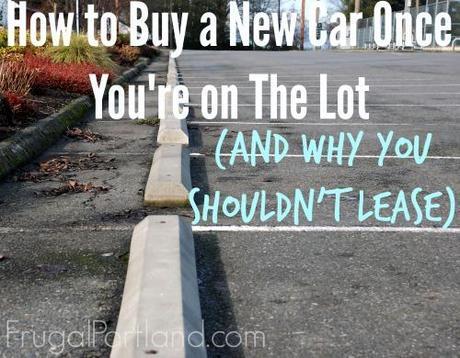This is Part III of the Frugal Portland Car Buying Guide. Click Here for Part I and Here for Part II.

Car buyers might not have all the information, but we do have the ability to conduct business over the internet. Once you find the exact car you want, solicit a price through the all of your area dealer websites (don’t go through TrueCar or Costco. These are third-party sales lead-generating programs that the dealers pay a subscription fee for. Guess who shoulders the fee in the negotiated price?). You’ll probably get phone calls within a half hour (I’ve been called within five minutes of submitting a request for quote). Be very precise with what you ask them. Here’s how my calls with the dealers went:
“I’m looking for a 2014 Mazda3 i Grand Touring with manual transmission. The color isn’t important to me, the only thing that matters is I get your best out-the-door price. I’m a prime borrower, so I’m confident I’ll qualify for your best financing.” (The MSRP for this car is $24,040.)
Within ten minutes, I had a quote in writing that said “$22,126 plus doc fees and DMV fees. Inlcudes $895 Green Package for Free!” Then, I submitted quote number two, and fielded a call from another dealer. I said the same thing, except I added, “I have a quote from your competitor for $22,126, and another on the way. I’m happy to forward you the quotes, but the bottom line is this: I’m going to buy from the dealer that provides me the best price out the door.” Ten minutes later, a new bid “$21,165 plus doc and DMV fees.” I called back, asked for them to roll in all the fees, and the final purchase price ended up as $22,224 as the bottom line, “No more added fees, I promise,” the salesman told me.
The third bid rolled in $1,500 higher than my in-hand quote. I called them in an attempt to discuss pricing, but we were so far apart on the quote, it struck me that they weren’t interested in haggling (which leads me to believe that this particular dealership had already reached its sales goals for the month).
Now, I could have pushed the issue. I could have played hardball with the so-called “Green Package” and said, “I don’t want it, I’d rather have the $900 off the bottom line,” to which they would have said “But it’s free!” and I would have said “It’s either not free or it’s not worth $900. Either way, I’d rather save the money,” and they might have under bid the other dealer by $100-200 or so, which would have had nothing to do with their add-on that I cared absolutely nothing about. Plus, they were playing cutesy with the extra fees, and I didn’t trust their party line.
That $22,224 quote was a no-shenanigans, straight down the line price. I considered it to be a fair price. I’m sure people have paid less. I’m positive people have paid more. But given the research I did, I believe it’s a very good price on that car.
At the Dealership
Look, the hard work is done. My expectations are set. If the dealership honors the price I was given over the phone, I will be an easy close. Otherwise, I’m walking out the door. It’s that simple.
I went to the lot, we briefly confirmed the price, he drew up the loan framework which added up to the number I expected. Credit application. Insurance check. And then I waited for my turn in the finance office.
I won’t lie, it was 90 minutes before I got to fill out the paperwork, but nobody was trying to hustle me for anything extra. Pleasant conversation while the finance manager finished up with his current customer, is all.
I spent 30 minutes pouring over the documents, reading every word, confirming every line. I looked for the prepayment clause in the document (there is no penalty), I looked for any unexpected fees (there were none), the numbers on the loan document were the exact terms I had been told over the phone a few hours before.
What About Leasing?
Don’t lease. It’s just a bad financial play all around. Leases look cheaper because of the lower monthly payment, but that’s just an illusion. Let’s say you lease 2014 Honda Accord LX for $199/month for 36 months (one of Honda’s advertised deals). You pay $2499 up front, then you pay $199 a month for three years, which comes out to $7164 (36*199). So, total, you’ve paid $9,663.
Then, at the end of your lease, you have three choices if you still want to be driving a car after three years:
- Buy out the car. First, they charge you a buyout fee (it’s listed in the lease contract), which can be between $200-$400 depending on the car. Then, you will probably need to finance the rest. If the residual value is of the car is $14,000 and you get a 2.9%, 3-year loan, then you pay $406 a month. Calculate that out, and the total you pay for the car ($400+9663 + 406 x 36) is around $24,700 for a $21,000 car.
- Lease another Honda. This is what the dealership wants. You turn in the 2014 car, lease a 2017 car, and the cycle starts again. Your payment might go up a little (maybe you want one with more features next time), but even if it stays exactly the same, that’s another $9,663 you have to pay for another three years. Then, you have the same thing happen again in 2020. Total over six years: $19,326, and you still don’t have a permanent car.
- Turn in the car and buy a different car. The dealership will charge you a “dispossession fee” which can be $300-$400 depending on the car. They will also charge you “excessive wear and tear” and will charge you for any excess mileage (leases allow you between 30,000-36,000 miles driven over the lease, then charge $0.15 per extra mile, which adds up in a hurry if you drive a lot). Then, you still have to go and buy another car.
Leases are attractive because they allow people to drive more expensive cars than they can afford to buy.
I leased my previous car, a 2011 Infiniti G37, and the experience of driving a $45,000 luxury sports coupe taught me a valuable lesson.
Some people swear by leases. My parents have leased their cars for almost 15 years now, and they love the fact that they get a new car every three years, and never have to worry about maintenance. I don’t find that argument very compelling, especially since they drive cars that are known for their reliability. But they are also financially literate people who know the downsides, so they go into the lease agreement with open eyes.
The Reason People Feel Cheated
People feel cheated at the car dealership for two reasons: they are unprepared or their expectations are too high.
People who wander onto a lot not knowing the difference between the Accord LX and the Accord EX-L have no reason to expect that they will come away with the best option. Similarly, people who focus exclusively on the monthly payment will face real, impactful financial consequences.
The unrealistic are those who seem to believe that the car dealerships are making money hand-over-fist on the deal. In reality, running a car dealership is very expensive. They would probably be surprised to learn that margins on new vehicle sales are only 8% (it’s the service department where dealerships really rake in the dough).
People like the idea that they are going to get a “win” over the fast-talking salesperson. And look, if you really think you’re not getting a square deal, you should absolutely walk away, but the cultural image of the car salesperson as a lying, cheating, stealing, good-for-nothing con artist is blown completely out of proportion. Really, these are just people working in a thankless, universally-hated profession with brutal hours. They get accused of being cheats on a daily basis. I’m not saying you need to send them a Christmas card, but cut the new car salesperson a little slack. If you go in to the process with information and confidence, you have nothing to fear from the salesperson or the dealership.
And remember, you have the most amazing superpower in the history of car shopping: the ability to walk away.
Image by Penywise

